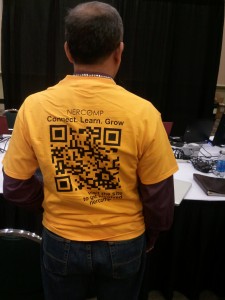 I attended yet another excellent NERCOMP annual conference from March 12-14. I am not saying this simply because Wellesley was very well represented and all of our presentations were VERY well received 🙂 It is a small enough conference where you can establish long lasting partnerships and catch up with others on what is going on. We all wore color coded T-shirts with QR code strategically placed on the back and because the theme was Mardi Gras, wore some beads! “Gold color” represented power – I am a Board member 🙂
I attended yet another excellent NERCOMP annual conference from March 12-14. I am not saying this simply because Wellesley was very well represented and all of our presentations were VERY well received 🙂 It is a small enough conference where you can establish long lasting partnerships and catch up with others on what is going on. We all wore color coded T-shirts with QR code strategically placed on the back and because the theme was Mardi Gras, wore some beads! “Gold color” represented power – I am a Board member 🙂
I was part of a leadership forum on Monday where we discussed a paper by Clayton Christensen called “Disrupting College“. It is a long 70 page position paper where, Christensen argues that disruptive technologies, especially online learning, should be adopted by the academia soon as a way to reduce the cost of postsecondary education while not compromising on the quality. It is a very interesting read. He also agrees that what he proposes may not be directly applicable to many of the elite institutions, however, not keeping on top of it and developing strategies is highly recommended.
(more…)
On March 6, 2012, LTS held the second conversation in the “Liberal Arts Learning in the Digital Age” Symposium where Angel David Nieves gave an excellent talk on “Hamilton College’s Digital Humanities Initiative: A Liberal Arts Model for Future Scholarship, Research and Teaching”. It was a very interesting and thought provoking presentation and the discussion that followed was very interesting as well. We had good attendance including several who watched the presentation remotely. Angel kindly agreed for us to post his presentation on YouTube, which you will see below.
So, what exactly is “Digital Humanities?” If anyone (including me) expected to get a clearer definition of this during this presentation that what we may already know, I don’t think that question was answered. Taken from the Digital Humanities Initiative website: “digital parlance for a research and teaching collaboration – where new media and computing technologies are used to promote humanities-based teaching, research, and scholarship across the liberal arts.” Obviously, if you replaced humanities with any other discipline, the same exact description would work too, so there is nothing particularly unique about such a broad definition. I think what Angel tried to convey was that the way in which scholarly works in Humanities are being produced in this new digital world is radically different from the way it has been done so far – mostly, the scholars working alone, using the institution’s resources, primarily libraries and librarians. By using the digital media and through collaborations extending worldwide, the work that is getting produced is very different and highly collaborative.
(more…)
 I attended yet another excellent NERCOMP annual conference from March 12-14. I am not saying this simply because Wellesley was very well represented and all of our presentations were VERY well received 🙂 It is a small enough conference where you can establish long lasting partnerships and catch up with others on what is going on. We all wore color coded T-shirts with QR code strategically placed on the back and because the theme was Mardi Gras, wore some beads! “Gold color” represented power – I am a Board member 🙂
I attended yet another excellent NERCOMP annual conference from March 12-14. I am not saying this simply because Wellesley was very well represented and all of our presentations were VERY well received 🙂 It is a small enough conference where you can establish long lasting partnerships and catch up with others on what is going on. We all wore color coded T-shirts with QR code strategically placed on the back and because the theme was Mardi Gras, wore some beads! “Gold color” represented power – I am a Board member 🙂